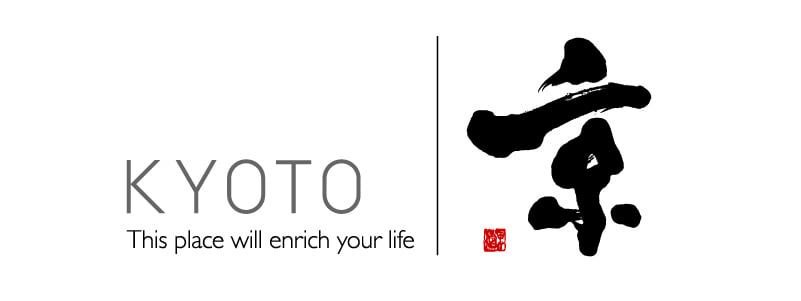Term archive
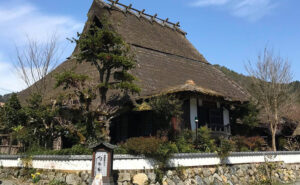
投稿タイプ:stay
Shunki An – Traditional Thatched House Inn & Cafe
It's a large renovated thatched roof kominka
Sit around the big size irori sanken hearth and relax
Only one group of guests per night.
Equipments & amenities:futon, blankets, pillows, fridge, air conditioner, kerosene heater.
* No yukata or pajamas. Please bring your own pajama.
Cafe is closed on Wednesday.
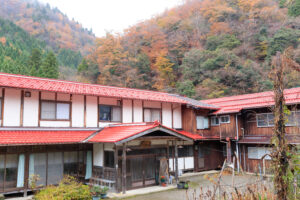
投稿タイプ:stay
B&B Harimaya
Nestled in the upper reaches of Miyamas valleys this is the perfect place to get away from the hustle of modern Japan and take things slow. You can enjoy authentic seasonal Japanese food harvested from the surrounding fields. There are numerous places to enjoy walking, cycling, fly fishing, river activities and other outdoor activities in the immediate area around Harimaya so be sure to take the time to explore.
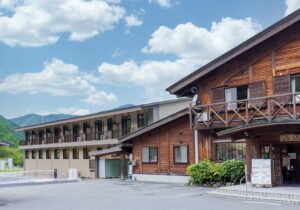
投稿タイプ:stay
Miyama Nature & Culture Village Kajikaso Inn – New Annex
Kajikaso Inn is located near the clear-flowing waters of Yuragawa river.
Its main building is featuring rooms with open-air baths, large public baths, and a spacious communal lounge area.
In 2021, our new annex building with all modernised facilities has opened. Kajikaso Inn is a great place to stay especially for larger parties.
Other than their lodging facilities, they also have a conference room as well.
Food
Serving local cuisines using seasonal Miyama ingredients. You can also enjoy seasonal Kaiseki course to enjoy mountain vegetables in spring, ayu sweet fish in summer, matsutake mushroom in autumn and wild boar meat hot pot in winter.
Activity
Its location is 2KM distance from Miyama’s thatched village, must-see sightseeing spot in Kyoto Miyama. Use here as your sightseeing base and enjoy walking or cycling to visit the heritage site.
Facility Information of New Annex
All guest rooms are on 2nd floor, viewing clear stream of Yura river from river side rooms or Miyama's beautiful mountain landscape from mountain side rooms. The rooms are for 4 persons with Tatami mat beds. Each room is equipped with a shower and toilet. The new annex is equipped with an elevator, making it easy for the elderly, wheelchairs, and large bags to move around.
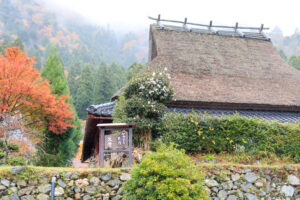
投稿タイプ:stay
B&B Hisaya
This is a bed and breakfast located in the heart of Miyama’s thatched village or Kayabuki no Sato. Staying at Hisaya gives you a sense of what it is like to live in a Japanese country village.
This 28 year old B&B is the ideal place to not only see but feel Japanese history. Through hard work and dedication, they grow their own vegetables and use only the freshest local ingredients to produce traditional rural home-cooking and creative cuisine for their guests. You might just feel like you’ve come home when staying here.
※B&B Hisaya renewed as the whole house rental type inn in spring 2022! Stay safe within the Miyama's thatched village with your family or friends!
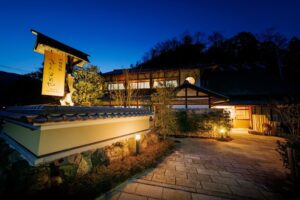
投稿タイプ:stay
Ryokan Kigusuriya
The Kigusuriya Annex is a traditional Japanese inn that offers a warm and inviting atmosphere, spacious private rooms, and delicious local cuisine. Three generations run this inn together and take pride in offering a genuine Japanese experience to their customers. The name Kigusuriya means natural remedy in Japanese as it was once a Meiji period Japanese pharmacy. It was established as an inn during the eighth year of the Taisho era (1919), when there were many travelers passing through Miyama from the Japan sea down to Kyoto. When you stay here you can feel the long history of the inn and experience the warm hospitality that has been passed down through the generations.
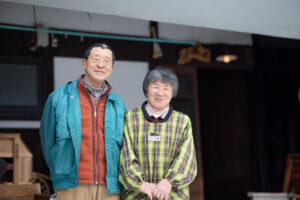
投稿タイプ:stay
Farmhouse Inn Kurian
This farmhouse inn is conveniently located at 10 min drive distance from the Thatched Village, well known heritage site.
Unwind and relax in this homelike inn!
Only one group per night. Max 4 persons.
Experience mountain vegetable gathering (spring), fireflies watching (summer), harvesting autumn vegetables (autumn), playing in snow (winter) and various other rural life activities.
Two indoor cats and one outdoor dog are also warmly welcome your visit.

投稿タイプ:stay
Kominka Inn THYME
Luxury cottage that is renovated traditional house in the rural quiet hamlet, set against backdrop of mountains. It's a new style accommodation where you can experience staying in the art gallery. Also, the view from wood deck terrace in its herb garden is stunning!
Further, your loved dogs are also welcome. Take your whole family (including dogs) and enjoy your vacation.
You can definitely unwind and relax from hectic pace of everyday life and slipping back in time.
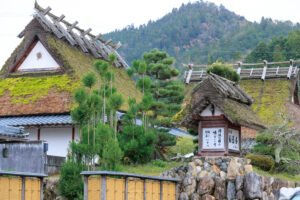
投稿タイプ:stay
Yamazato Ryori Ryokan Isobe
This Japanese style inn is located right in the heart of Miyama. The main building, the thatched house, is available to rent as a single unit and is an ideal place to stay with your family or a group of friends. The traditional Japanese architecture is charming and has plenty of history. As well as the thatched house they also have single rooms that can be rented out in the annex. Meals at the main building can either be enjoyed in the restaurant (which has table seating),or in the large banquet hall. For your meals you can enjoy a variety of seasonal ingredients such as mountain vegetables, fresh ayu (sweet fish), handpicked matsutake mushrooms, wild boar and deer (caught by the owner) be enjoyed
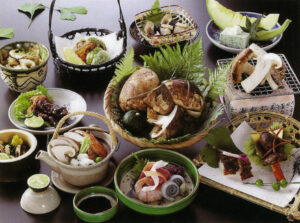
投稿タイプ:restaurants
Miyamoto-ya
Miyamoto-ya is a restaurant in Kameoka City. Boasting a history of over 90 years, Miyamotoya’s course meals feature the best of the Tamba area's seasonal produce, such as mountain plants in spring, and the summer delicacy of sweetfish (known also as “fragrant fish” due to its fresh fragrance).
The authentic full course meals are served at traditional-style floor seating. There is also table seating where customers can enjoy casual Japanese meals for about 1,000 yen per person without a reservation.

投稿タイプ:column
The Terroir of Kyoto on a Plate: Seven Great Local Eateries

投稿タイプ:sightseeing
Fukuchido Hanko Café
Located close to Fukuchiyama Station, Fukuchido is a long-established shop for "hanko" (personal seals) founded in 1947.
In 2022, the Hanko Café opened within the shop.
Popular products include sweets made with Tamba chestnuts, grown by the café owner, and blended coffee that goes perfectly with them.
You can also rent e-bikes and guided tours here.
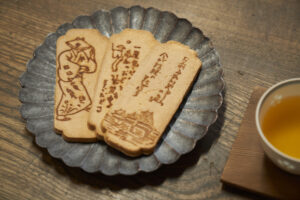
投稿タイプ:sightseeing
Chikiri-ya Odori Senbei Honke Sweets
Located near Fukuchiyama Castle, built by the famous samurai Mitsuhide Akechi, Chikiri-ya is a Japanese traditional sweets shop established in 1920.
It's popular odori (literally, ""dancing"") senbei were created to give Fukuchiyama a delicious rice cracker the city could call its own, and were perfected after traveling across the country to research the best in senbei.
Amongst locals, Chikiri-ya has been a fond favorite for many years.
